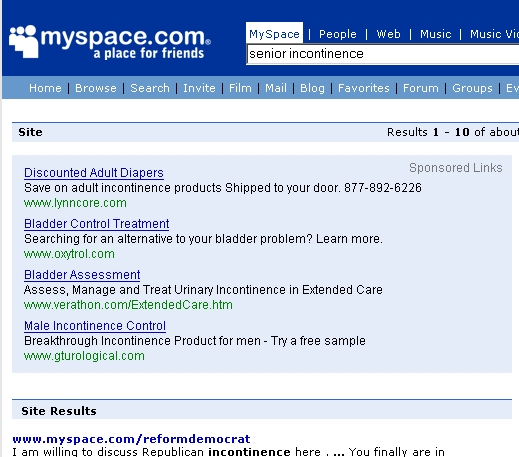By Larisa Thomason
It almost seems comic now in 2007. But one of the big election stories in the 2000 campaign was John McCain’s decision to put his Web site address on his yard and rally signs. The Web site 4President.us has a screen shot and an accompanying article.
McCain noted on April 30, 1999 that:
“The Internet provides us with a new and exciting opportunity to communicate directly with voters,” said McCain. “Each of us can now become better informed and more closely involved with candidates and their positions on the issues. Using sites like mine, citizens young and old can find the information they need to make more educated choices about their leaders.”
A prescient statement, but – if anything – Senator McCain underestimated the impact of the Web on political campaigns. Changes have taken place at lightning speed. Here’s a quick timeline:
1996: The Dole/Kemp campaign announces the launch of the first customizable, interactive political Web site.
2000: John McCain puts his Web site address on signs and participates in online chats. The site also includes biographical videos.
2004: Howard Dean becomes the first true, Internet-powered candidate, raising an astonishing amount of cash online, organizing support via Meet-ups, and a chatty campaign blog.
By 2004, the coveted “grassroots support” factor had evolved to “netroots support” and everybody wanted some.
But even as candidates jumped on board with interactive sites, blogs, and custom tools, most completely ignored one of the most critical components of a successful Web site: getting people there in the first place!
Or, as we call it, Search Engine Marketing.
At least, they ignored the whole process until this past 2006 election cycle.
The Rimm Kaufman Group, an online marketing agency, conducted this study of paid search advertising during the 2006 election cycle.
The money quote (emphasis added):
“We conclude that paid political advertising on the search engines is still in its infancy. Note the cost of search advertising is a fraction of the cost of television advertising, yet often has comparable reach.
We anticipate search engine marketing will become increasingly prevalent to the American political process in coming elections. In the 2008 elections, we predict political advertisers will completely fill the paid search spots on the first page of Google search results pages; political advertisers will advertise heavily on Yahoo; political advertisers will use more video; and Democrats will increase spending to match Republicans. “
Some current trends tend to prove them right. Just do a search on Google for different candidate names and you see that not only have most candidates jumped into paid search, they’ve gotten canny about it too.
Republican candidate Mitt Romney is the leader so far. Search on “Rudy Giuliani,” “John McCain,” “Sam Brownback,” or “Tom Tancredo” (all rivals for the GOP nomination) and a link to Mitt Romney’s site appears in the AdWords results section.
In contrast, Bill Richardson, Wesley Clark, and Tom Vilsack are the only Democratic candidates running any paid ads at all – at this time.
That’s a surprise, given the preference of Democrats for news delivered via newspapers, magazines, and the Internet. The NewsCorpse Web site discusses a study of news preferences broken out by political preference published in Editor & Publisher, noting that Democrats preferred written and online news sources:
…breakdown by percentage of Dems vs. Repubs for each type of media:
Red Media:
Preferred by those inclined to vote Republican.
|
Repub |
Demo |
| TV News |
87% |
83% |
| News Radio |
62% |
51% |
Blue Media:
Preferred by those inclined to vote Democratic.
|
Deno |
Repub |
| Local Newspaper |
78% |
70% |
| National Newspaper |
24% |
15% |
| News Magazine |
21% |
16% |
| Internet News |
43% |
38% |
So why aren’t the Democratic presidential candidates for 2008 jumping into the fray, and what’s up with those Republicans who also lag behind Mitt Romney?
Maybe they the need the guidance of professional search engine marketers! Too many campaigns are run by political science majors. Not that there’s anything wrong with that – except that not many are technologically literate.
I see this as a fertile field for search engine marketing professionals. Here, I’ve only discussed the declared presidential candidates, but there are numerous state races, local races, and all 435 members of the House of Representatives in contention in 2008.
Think of all those clients!
And remember, in most cases, we’re talking about opportunities in both the primaries and general elections.
In my opinion, most campaigns don’t have the time for a full SEO campaign to work. Some lucky campaigns will benefit from increased link popularity when plugged-in supporters add home page links to their blogs, sig lines, and other Web sites, but that’s for the major, highly visible campaigns.
The real opportunity here is in managing a paid search campaign. Think about the benefits: the campaign gets instant exposure – even when the searcher may be looking up a rival!
Political search engine marketing is potentially a lucrative sideline; it’s also a way for an SEO professional to do some pro bono work for causes that really matter to them personally.
It’s a win/win situation either way.
Keep this opportunity in mind as you consider what sign to put in your yard, what sticker to attach to your car, or where your carefully-considered contribution dollars will go this year.


